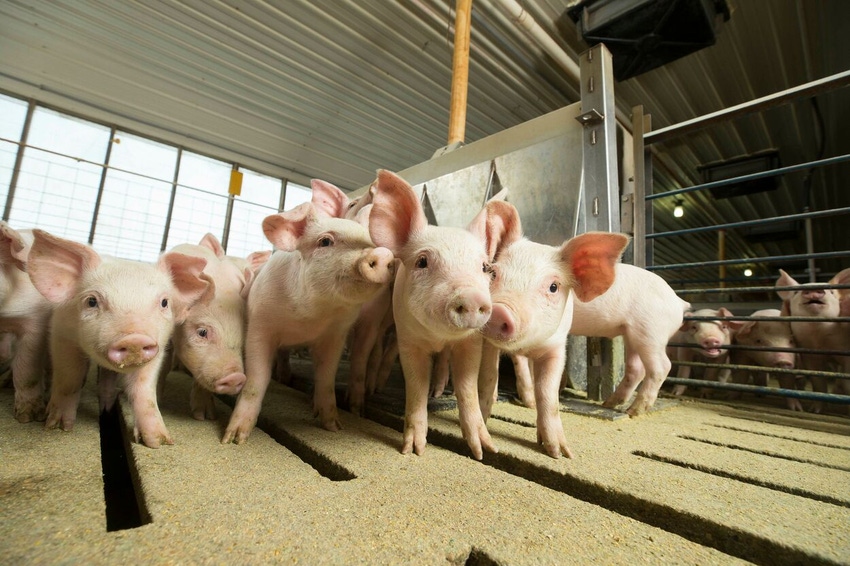Feeding benzoic acid throughout the entire nursery phase
What are the impacts on weanling pig growth performance and fecal dry matter?
November 10, 2022

Including an optimal level of an acidifier within the diet throughout the nursery phase has the potential to improve growth performance of weaned pigs and improve economic return for producers. Acidifiers, such as benzoic acid, are suggested to lower the pH of the gastrointestinal tract. The reduction in pH can potentially lead to improved nutrient digestion, growth performance and gut microbiota.
Benzoic acid has previously been shown to improve growth performance and intestinal changes in nursery pigs. However, there is limited research describing the effects of various levels of benzoic acid fed throughout the entire nursery phase. Therefore, the objective of this study was to investigate the effects of varying levels and feeding durations of benzoic acid in nursery diets on growth performance and fecal dry matter.
A total of 350 weanling barrows (DNA 200 × 400; initially 13.0 ± 0.08 lb) were randomly assigned to pens and pens were allotted to one of five dietary treatments with 14 pens per treatment. Diets were fed in three phases: phase 1 from weaning to day 10, phase 2 from d 10 to 18, and phase 3 from d 18 to 38. Dietary treatments were formulated to provided 0, 0.25 or 0.50% benzoic acid (VevoVitall, DSM Nutritional Products, Parsippany, NJ) added at the expense of corn.
Treatment 1 served as the control and contained no benzoic acid throughout all three phases. Treatment 2 included 0.50% benzoic acid throughout all three phases. Treatment 3 contained 0.50% benzoic acid for phase 1 and phase 2, but only 0.25% benzoic acid in phase 3. Treatment 4 contained 0.50% benzoic acid in phase 1 and phase 2, and no benzoic acid in phase 3. Treatment 5 contained 0.50% benzoic acid in phase 1, 0.25% benzoic acid in phase 2 and no benzoic acid in phase 3.
Along with growth measurements, feces was collected on d 10 and d 24 from three pigs per pen to determine fecal dry matter. Samples were dried at 130 degrees Fahrenheit for 48 hours and loss of weight used to determine fecal dry matter percent.
Results and discussion
From d 0 to 10 (phase 1), pigs fed 0.50% benzoic acid had increased (P = 0.034) average daily gain, improved (P = 0.049) feed to gain ratio, and heavier (P = 0.040) d 10 body weight than those fed the control diet (Table 1).
From d 10 to 18 (phase 2), pigs fed 0.50% benzoic acid had increased (P P = 0.033) benzoic acid and a marginally significant increase in ADFI for pigs fed 0.50% (P = 0.069) benzoic acid in phase 2 compared to pigs fed no benzoic acid; however, they did not differ from each other. Additionally, pigs fed 0.50% benzoic acid had increased (P = 0.012) d 18 BW compared to pigs fed no benzoic acid.
From d 18 to 38 (phase 3), pigs fed 0.50 or 0.25% benzoic acid had increased (P P
For the overall experimental period (d 0 to 38), pigs fed 0.50% benzoic acid in the first two phases and 0.25% benzoic acid in the final phase had a greater (P P P
Fecal dry matter was not impacted by dietary treatment.
In summary, the data suggest that feeding benzoic acid for the first 38 days post-weaning improves ADG and F/G but did not alter fecal dry matter. In this study feeding 0.50% benzoic acid in all three phases or 0.50% benzoic acid for the first two phases and 0.25% in the third phase resulted in improved growth performance throughout the 38-d period.
This data along with additional information research on utilizing dietary acids in nursery and finishing pigs will be discussed more in-depth at the 2022 K-State Swine Industry Day on Nov. 17.
Source: Katelyn N. Gaffield, Joel M. DeRouchey, Mike D. Tokach, Jason C. Woodworth, Robert D. Goodband and Jordan T. Gebhardt, who are solely responsible for the information provided, and wholly owns the information. Informa Business Media and all its subsidiaries are not responsible for any of the content contained in this information asset.
You May Also Like

.jpg?width=300&auto=webp&quality=80&disable=upscale)

